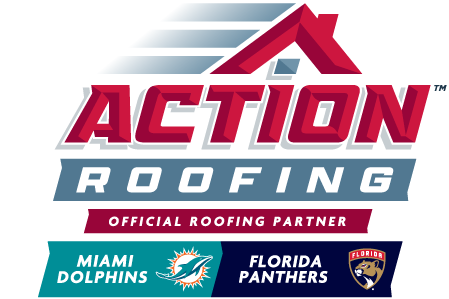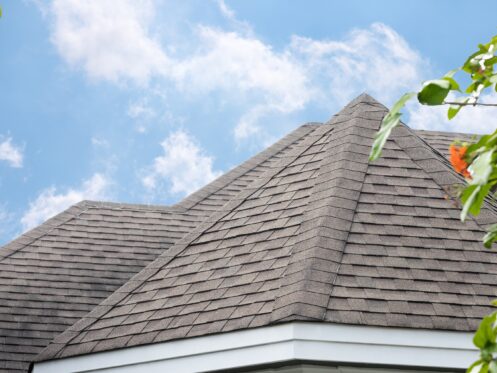The roof on your home is the first line of defense when protecting you and your family from storms. In Fort Lauderdale, intense storms and hurricanes are frequent, so knowing the difference between the types of roofs available is imperative. Once you see what is available, you can select the best option to protect your home. The two most common types of roofs are flat roofs and pitched roofs. In this guide, we will discuss what each is, the pros and cons of both options, and help you decide the best choice for your home.
What Is a Flat Roof?
A flat roof falls into this category because the slope on the roof is less than 10 degrees or essentially flat. This slight slope allows water to drain off the roof during a storm. However, without a steep slope, they can quickly become a place where rainwater sits. This can be bad in Florida weather, and it can cause damage to your home during a heavy storm. These roofs are great for resisting the wind, so if you have a steep enough pitch, they could be a good option.
Advantages
Flat roofs have a distinct advantage when it comes to price. They cost about $7,000, significantly less than a pitched roof. Because they are essentially flat, they are resistant to strong wind. This is because the roof is close to the walls of your home, which provides an added layer of protection.
A flat roof also has no slope to minimize indoor space. This means that ducking and losing space on the top floor of your home is not an issue. Also, flat roofs can accommodate solar panels and HVAC systems to help reduce energy usage.
Disadvantages
One disadvantage of a flat roof is that water can pool on it without an easy way to drain. This can lead to leaks and other damage, especially during the stormy season. Flat roofs require more maintenance over the years to ensure that they are still as durable as they need to be. This is mainly to clean away debris that has fallen into the gutters and ensure the integrity of the roof.
This type of roof also has a shorter lifespan because debris and other materials sit on it and increase the rate at which the roof deteriorates. It adds less value to homes because its lifespan falls between 10 and 30 years.
What is a Pitched Roof?
Also known as a sloped roof, this type of roof has a design that allows rain and snow to leave quickly. Depending on the roofing materials you use, the pitched roof can last quite a while. These roofs are great for curb appeal, as they are more visible when you look at the house. The slope on these is more than 20 degrees, though the angles can vary.
Advantages
A pitched roof offers excellent drainage, ideal for the downpours often seen in Fort Lauderdale. They are better options for insulation if the home’s roof, so that you can use the attic space as a living space. This will also help to keep your living space cool during the hot summer months.
A slanted roof has a modern look, and if kept up to date, it will increase the value of your home. Many love the timeless aesthetic that this type of roof provides, so interested parties will offer a higher value when it comes time to sell the property.
Disadvantages
These roofs are more expensive to install because they use more materials to create this slanted look. That said, the installation process could take a while to manage. This is because the slant of a pitched roof can be steep, and we want our team of professionals at Action Roofing to be safe during your roof replacement. Likewise, with this large slant, maintenance needs may face the same challenge.
Another disadvantage is that HVAC units cannot fit on a sloped roof. This means that during the installation process, the unit will cut into your space on the top floor of your home. This might not be an issue in an attic, but in a finished room, it may be noticeable.
Key Factors to Consider
Since you are living in Florida, where storms occur every year, there are a few factors that you should consider before deciding between a flat and a pitched roof. Let’s take a look at some of the most important.
Weather Resistance
When it comes to wind, both roofs can be good options. However, the amount of wind that a roof can handle is dependent on its slope. A flat roof is always going to be wind resistant, but a pitched roof that does not have a slope much over 20 degrees is also going to be resistant to the wind.
Rain drainage is also a concern in Florida. That said, a flat roof can have drainage issues, especially with a small slope. A pitched roof is great for drainage, so with proper maintenance, leaky roofs are far less of an issue. Poor drainage will lead to damage and a higher likelihood you’ll need expert roof repairs more often.
Energy Efficiency
Both roofs can use reflective shingles or coating to make the roof absorb less heat in the summer. You can install solar panels on flat roofs, so this can help you save more energy. However, pitched roofs can have insulation in the attic to help keep the space cooler during the summer. Additionally, you can add more ventilation to the roof to create better airflow in your living space. This is optimal for residents of Fort Lauderdale because humidity can become a problem in attics with insufficient airflow.
Installation Costs and Lifespan
On average, installing a pitched roof costs about 22% more than a flat roof. However, you can expect the exact opposite regarding maintenance costs. A flat roof requires cleaning, inspections, and resealing once a year because of the intense Florida sun and unpredictable weather. With proper maintenance, a flat roof only lasts up to 30 years.
A pitched roof requires far less maintenance than a flat roof, though after a severe storm, we still suggest getting your roof inspected to ensure no damage. The lifespan of these roofs provides you with more years of use, as a well-maintained roof can be viable for more than 100 years. There are different types of roofing materials you can use for flat versus pitched roofs, and these have different maintenance requirements and lifespan expectations.
Contact a Dependable Roofing Contractor
There are benefits to having both a flat and a pitched roof in Fort Lauderdale, so base your decision on the key factors that we discussed above. Wind and rain are always concerns, so regardless of the roof you select, make sure the slant is optimal for wind.
At Action Roofing, we have been serving Fort Lauderdale since 1986, so we know the type of roofing that will be best for your home. Call us today for a consultation!




